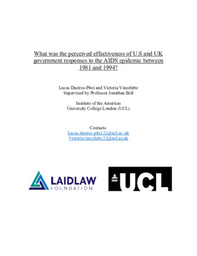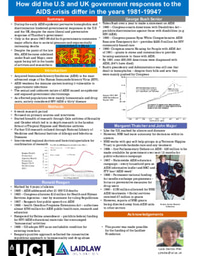Introduction
Following on from a wonderful first year with the UCL Laidlaw cohort, I was inspired to learn more about the importance of leadership in research. I therefore sought out a project which emphasized being a well-rounded leader that understood the importance of teamwork, collaboration and information in leading and providing guidance. Thus I was drawn to an LIA at the Duke Global health Institute which challenged my perceptions and made me a more conscientious leader through understanding the importance of research and collective action in providing direction to important figures and organizations with a global reach. As such, my LIA provided a platform to learn more about global problems, whilst allowing my work to contribute to lasting change.
What is the Duke Global Health Institute?
The Duke Global Health Institute (DGHI) is an innovative global health research and education centre which brings together knowledge and resources from across Duke University. The institutes seeks to address the most important global health issues of our time by preparing global health leaders through interdisciplinary education, seeking innovative solutions to the world’s most pressing global health challenges by conducting research, designing policies, implementing evidence-based interventions and being a partner for change by engaging international and local organisations in locally grounded, collaborative projects. As such, the institute has been a research partner for the World Health Organisation and the Africa Centres for Disease Control and Prevention, through its 247 research projects and advisory faculty.
What did I do?
As a visiting scholar, I joined Dr Ogbuoji and his team of post-graduate researchers in the 2nd stage of their systematic review of papers for the ‘Agenda Setting of Child Health Policies in Low to Middle Income Countries’ project. In the project, we were looking at the factors that determine the prioritization of children’s health and why some countries prioritise children’s health compared to others. Using Shiffman and Kingdon’s frameworks for political prioritisation, we created a robust agenda setting criteria for our review, with a focus on changes to national/subnational policies, plans and funding.
With a theoretical base, I worked on a meta-analysis of over 600 academic papers to ensure validity and usefulness for the study. I came across multiple new children's health topics in my review which provided a greater understanding of global healthcare and helped expand upon my previous HIV-AIDs policy research from my first year of study. The project also gave me an opportunity to learn how to use Covidence, a tool to streamline papers and articles for large scale research projects such as the one I was working on.
What did I learn?
The project gave me a unique understanding of the world of professional academia and its importance in defining policy at a national level. I succinctly remember Dr Ogbuoji telling me that without the research to back them up, multi-national healthcare organisations such as the WHO or politicians in charge of national healthcare regimens, cannot bring issues to the agenda setting table and thus daw in funding to combat epidemics and healthcare issues. Despite some considering this a simple take, it draws upon the importance of research in policy and how an interdisciplinary approach is almost always necessary when it comes to healthcare policy.
Another key takeaway was the importance of understanding and accepting multiple points of view to come to a collective conclusion. During the meta-analysis, some of my colleagues often had conflicting views on whether a paper should be included within the study. This led us to review the criteria together and work upon analysing whether the paper fit the agenda-setting mould. In some cases, I was wrong, and the project helped me take in other points of view when working as a team and leading certain aspects of a project.
Overall, working with the DGHI was an incredibly rewarding experience, as I learnt more about conducting research at a more professional level and doing it for the betterment of children’s health. I am very grateful to Dr Ogbuoji, DGHI and the Laidlaw Foundation for offering me the opportunity to undertake this continued research and I look forward to using my newly acquired skills for further research and development.


Please sign in
If you are a registered user on Laidlaw Scholars Network, please sign in